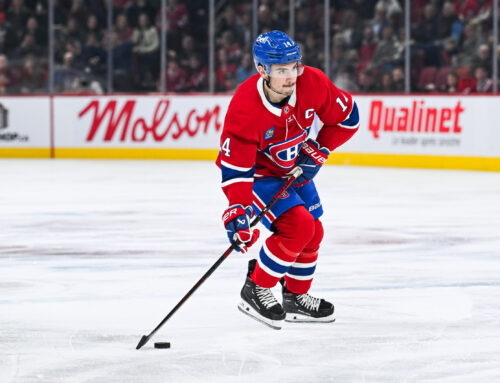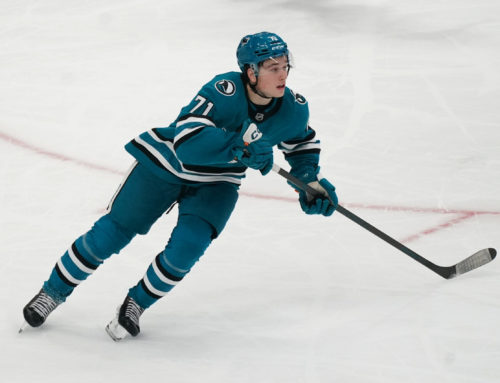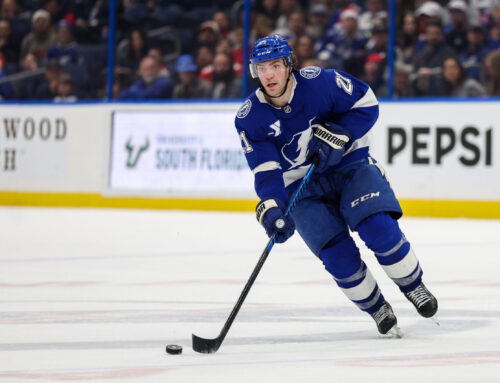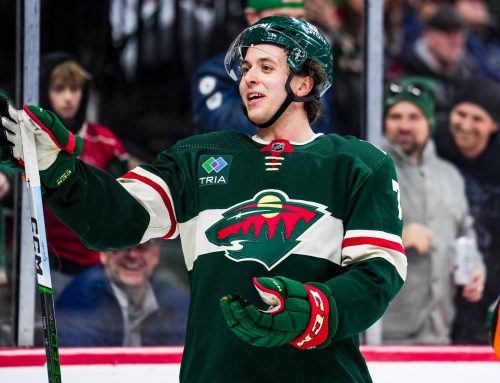
Welcome to the first installment of what will be a monthly fantasy hockey mailbag column. The concept is simple – you send me (instructions are provided at the end of the column) questions about fantasy hockey and I address them here in a way that not only gives you the answer(s) you’re seeking but also provides useful fantasy advice and food for thought to other readers, even if they don’t own the same players. Without further ado, here are this week’s questions and answers.
Question #1 (from Louis-Philippe)
Elias Lindholm and Sean Monahan will be available in my points-only cap keeper league (goals count as much as assists). I have the first pick next season and am wondering who’s the better choice, given (1) Monahan is paid ~$1.5M more while having one year less on his contract, but (2) this is Lindholm’s first great season, while Monahan is more proven, plus (3) Monahan is a center, versus Lindholm being a wing, and (4) some have speculated/observed that Mark Giordano tends to pass to Lindholm on the PP, based on his stick-handling side, helping Lindholm but for how long considering Gio’s age.
Your league is points only; that’s important, since if it valued goals more heavily then Monahan’s status as a sniping center (7th most tallies among centers over the previous four seasons) would be a key asset. But in your league, that has no bearing. Accordingly, answering the question largely depends on if we should view Lindholm as having “arrived” or go with the perhaps safer bet in Monahan.
One key is the IPP stat (i.e., the percentage of times a player gets a point when a goal is scored while he’s on the ice), as despite his surge in scoring Lindholm is receiving a point on only 62.7% of goals scored while he’s on the ice overall, but at a rate of 68.6% on the PP. In contrast, Monahan’s even strength IPP is 73.4% (Johnny Gaudreau’s is 78.3%) versus a mere 52.6% with the man advantage. That speaks to your point about Giordano and the PP running through Lindholm, but also raises concern that Lindholm is being propped up by PP scoring. After all, Lindholm is on pace for 32 PPPts, and the total number of wingers who had even 25 PPPts in three of the past five seasons is three; so even if the PP keeps flowing through Lindholm, past results would suggest he’s likely to see his PP scoring drop.
While there’s also room for Lindholm’s overall IPP to increase, I wouldn’t bank on it happening what with the chemistry Gaudreau and Monahan have at even strength. That's where most goals are scored. In fact, 46 of Monahan’s 47 ES points thus far this season have been scored with Gaudreau on the ice, and 47 of Gaudreau’s 52 ES points with Monahan on the ice.
In the end, Monahan is the surer thing in view of his magical even-strength connection with Gaudreau and Lindholm’s likely unsustainable reliance upon PP scoring. Thus, I’d go with Monahan as your pick, unless wingers are at a big premium in your league or the added cap hit really hinders you.
Question #2 (from Stewart)
Is Pavel Zacha worth retaining in a keeper? I’ve seen some of New Jersey’s games and I like his speed, but his point totals haven’t improved over his first three seasons.
Zacha hasn’t been put into a position to thrive thus far in his young career, what with not averaging more than 16 minutes of ice time or even two minutes of PP time per game in this season or either of his prior two campaigns. He’s also barely ever had a sniff of time on the same line as Taylor Hall. These things having been said, my take is although Zacha is still very young and has only about 200 NHL games to his credit if he was going to pan out he already should be doing better than he is.
One area I examine closely when assessing a player who’s been/being underutilized or otherwise not deployed in a way likely to lead to success is IPP. In his first full season, Zacha’s overall IPP was 70.6%, or above the 70% mark which – based on all my cage matches – seemed to be a threshold for separating players who might be very good from those who might be merely okay. Yet from there his overall IPP has nosedived to 62.5% in 2017-18, then this season to 45.9%, ranking him 337th among 349 forwards who’ve played 40+ games! Yikes…….
The issue is a skilled player coupled with lousy linemates, or otherwise not deployed optimally, should, if anything, have a higher IPP because the other less talented players on the ice aren’t as likely to have a nose for scoring. Accordingly, Zacha’s IPP being lower for the second year in a row while playing mainly with not so great players like Jesper Bratt, recently traded Marcus Johansson, Drew Stafford, and Miles Wood is a concern, especially coupled with a SOG rate that’s down a good bit from last season as well.
Beyond this, there’s his poor trend in PPPts. In 2016-17, he had the 173rd most PP minutes among NHL forwards, yet tied for 95th in PPPts. Last season and so far for 2018-19, however, his PP production was in line with his PP time, ranking 230th in PPPts and receiving the 227th most PP Time among forwards last season and 204th and 199th for 2018-19. So even when he gets chances on the PP, he’s not making the most of the opportunity. Collectively this paints the picture of a player whose effort level isn’t there. And for a young, still largely unproven player, that can lead to continued subpar deployment.
Of course, Zacha could be frustrated with his situation and might respond if put with better linemates or given more/better ice time, which raises the age-old fantasy dilemma of opportunity only coming when one plays well but one needing opportunity to play well. Let’s also not forget that Zacha is still only 21 years old, and, once signed to a new deal this summer, could hopefully get better opportunities. Plus, players with natural speed and agility sometimes take a while to “get it”. Look at Andreas Athanasiou in Detroit, for whom things didn’t really start to click until this season at age 24.
On the flip side, now that Marcus Johannson has been traded the reality is all other Devils forwards of consequence are signed through next season, leaving Zacha perhaps in much the same (or even worse) situation for 2019-20. Also, we can’t ignore that Zacha, who’s from Europe, could decide he doesn’t like his situation with New Jersey and opt to sign overseas this summer. It’s a longshot, but not impossible.
Given all this, Zacha would be worth keeping, I think, only in leagues where 200+ forwards are owned and you don’t have better options in terms of younger, unproven talent. In those leagues, you keep him and hope for the best. Anything less than 200 forwards, and my take is you have to toss Zacha back into the draft pool because there are likely better options to retain, especially since not keeping him still leaves you open to redrafting him – that is, the mere fact you don’t keep a player doesn’t prevent you from drafting him again should you desire.
Question #3 (from Dave)
I’m in a points-only (goals weighted the same as assists) keeper league. In our active line-ups, we play a total of 10 F, 2 D, 1 G, and we have a farm of up to 45 players. In this setup, would you trade Timo Meier for Kaspari Kapanen and Kevin Fiala?
An old adage is the winning side of a trade – in the real NHL or fantasy – is the side which gets the best player in the deal, and that still can be true if the one player is being traded for two players. But is it true in this specific case? I say yes.
The key here is your league only starting ten forwards, which places an enormous premium on being able to own those whom you can bank on getting 70+ points (note – you didn’t indicate how many teams are in the league, so perhaps if it’s a 12 team league then you want 60+ points from each of your ten forwards – you get the idea). Of these three players, the one who’s not only the most likely to pay dividends sooner, but also pan out best in the end, is Meier.
I’m basing this not just on what we’ve seen from Meier in 2018-19, but also since he’ll have two 20+ goal 200+ SOG seasons by age 22, which is something only 24 other players have also accomplished since 2000-01. Among those 24 who are now age 25 or older, nearly two-thirds have tallied 90+ points at least once in a season, versus, by the end of this season, only one has failed to record more than 65 points at least twice. Read that again and really let it sink in – it’s eyebrow-raising food for thought.
Kapanen plays for a team that’s very good now and poised to get even better, which, when it comes to the fantasy value of non-superstars, is as much a curse as a blessing since although they’re on high scoring squads top PP minutes are harder to come by as are a steady spot in the top six and points when sharing the ice with stars. Fiala’s trade should get him more and better minutes, but he’s still largely unproven and took a step back this season, such that he might not thrive even if given an expanded/improved role. In the case of Meier, the “two Joes” won’t be around much longer, or if they are their roles figure to be deemphasized, leaving the door open for Meier to thrive even more so than he has thus far since he’s hardly played at all with Thornton and not been reliant upon Pavelski to prop him up.
Long story short, I’m taking the Meier side. In fact, for me not to take him it would have to be a league where there are more than 150+ forwards rostered, as in that case if Kapanen and Fiala each score 10 to-15 points less than Meier it still might be better for your team because you get two of what figure to be the top 125 forwards, whereas if you get Meier in the trade you probably have to pick up a free agent to take the place of the extra forward you dealt, and that free agent might only get you 40 or so points, leaving you with less in the aggregate than if you’d kept Fiala and Kapanen.
Question #4 (from Eric)
I just joined a points-only keeper league where three defensemen start. I have the first pick and am considering whether to trade it to the GM who owns Rasmus Dahlin. My reasoning is I think Dahlin will become a generational fantasy talent but Jack Hugues, whom the other GM would assuredly pick, will be merely very good. What do you think?
This is a tough question in that I have no NHL data on which to judge Hughes and only a partial season’s worth on Dahlin. We do know Dahlin is on pace to easily score 40+ points as an 18 year old, and the only two other rearguards who previously tallied 40+ points as 18-year-old NHL rookies were Bobby Orr and Phil Housley, both of whom went on to have careers which, in today’s day and age, would indeed make them generational talents in terms of fantasy.
Does that mean Dahlin will fall into the same category? Not necessarily; after all, take the case of Aaron Ekblad, who fell just one point short of the 40 mark as an age 18 rookie and, barring a scoring binge over last chunk of this season, will still yet to have tasted even 40+ points (or scored at a 40+ point 82 game scoring pace) in his now five-season NHL career.
One thing also to consider though, is that if Dahlin becomes a superstar it could take a while. After all, since 2000-01 only two rearguards have tallied 55+ points by age 21 – Erik Karlsson and Drew Doughty. Could Dahlin become Karlsson 2.0? It’s possible, as Karlsson had 71 points in his first 135 games before exploding and becoming the player he is now. But for every Karlsson, there are plenty of once highly touted players who simply didn’t end up panning out, or others, like Morgan Rielly, who took a while to rise to superstar status.
As for Hughes, for what it’s worth there’s been an excellent success rate among first overall picked forwards over the last decade, including the likes of John Tavares, Taylor Hall, Steven Stamkos, Nathan MacKinnon, Connor McDavid and Auston Matthews, compared to only one total bust (Nail Yakupov) and one merely good player (Ryan Nugent-Hopkins). But can we rightfully compare Hughes to any of these now star players, especially when all of them – with the exception of Matthews – were by-products of the Canadian Juniors? One thing we know about Hughes is he’s becoming more of a playmaker, with a shrinking goal to assist ratio with each season. And although at first, that seems to beg for comparison to McDavid, it’s also more similar to RNH than the other top picks, each of whom was a prolific goal scorer before coming to the NHL. And say what you will about Hughes, but almost no one is putting him in the same category as McDavid, which thus perhaps makes him most analogous to RNH.
One other point is that Dahlin is on a Buffalo team on the rise. And don’t let Buffalo’s recent acquisition of Brandon Montour scare you off – he’ll fall below Dahlin and Rasmus Ristolainen in the pecking order. Basically, think Nick Leddy as the third wheel (behind Duncan Keith and Brent Seabrook) in his Chicago days. In contrast, Hughes likely will find himself on a struggling team, maybe making it more difficult for him to succeed, at least in the near term. Look at how that held back a player like MacKinnon early on.
It would’ve been helpful to know how many teams are in your league and how many forwards start at each position. After all, my answer could vary if you’re in a 16 team league versus an eight-team one and if you have only two forwards who start at each position versus more.
But based on the information I have, what I might do is try if I was in your shoes is to offer the pick to the Dahlin owner and also see about getting something more in return, maybe by talking down Dahlin’s value to the other GM due to the Montour trade? For example, you can try to trade one of your weaker forward keepers for one of his stronger ones as part of the deal. That helps guard against the unknown of Hughes and Dahlin’s futures while upgrading your team via a trade of more well-known assets.
*********
Thanks to those who sent in questions this week – sorry I couldn’t answer them all. Although my next mailbag isn’t for another four weeks, it’s never too early to start sending me more questions, which you can do in one of two ways: (1) emailing them to admin@dobbersports.com with “Roos Mailbag” as the subject line, or (2) sending them to me via a private message on the DobberHockey Forums, where my username is “rizzeedizzee”.
When sending me your questions, remember to provide as much detail about your league/situation as possible, since as you saw above in a couple of the questions there were some omitted details which made it difficult for me to give a truly proper answer. Examples of the types of things I need to know include what type of league you’re in (i.e., limited keeper, dynasty, or one-year; roto vs H2H), does the salary cap matter, how many players are rostered (and of those, how many start at each position), what categories are scored and how are they weighted, plus other details if necessary (such as free agents available if you’re thinking of dropping a player or rosters of both teams if you’re thinking of making a trade). The key is to tell me enough for me to give you a truly proper answer, and for readers of this column to benefit from the answer/advice I provide. When in doubt, err on the side of inclusion. See you next week for the return of Goldipucks and the Three Skaters!





 FLA
FLA EDM
EDM OTT
OTT NYR
NYR CHI
CHI BUF
BUF CAR
CAR WSH
WSH
